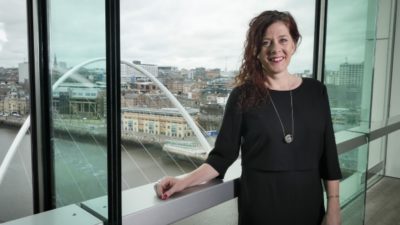Kate Lovell, disabled theatre-maker and Agent for Change at Theatre Royal Stratford East, unpacks the meaning of her unusual job title, exploring how this Arts Council England initiative is a unique model for improving access to theatre for disabled people as artists and audiences.

It’s a job with a 007 title, but to be an Agent for Change is far from a covert mission. Embedded within six theatres across England, there are six Agents for Change whose role it is to keep disability arts and accessibility at the top of the organisational agenda. This new role was created as part of a national Arts Council funded project called Ramps on the Moon, which is the brainchild of the New Wolsey Theatre in Ipswich and supported by disability arts trailblazers, Graeae Theatre Company.
All national portfolio organisations (those that are regularly funded by Arts Council England) signed-up to the project have made a commitment to increasing disabled audiences, casting more disabled actors on their stages and getting disabled artists making work for their buildings. Along with the New Wolsey, Nottingham Playhouse, Theatre Royal Stratford East, West Yorkshire Playhouse, Birmingham Rep and Sheffield Theatres are part of the collaborative network.
The delightfully ambitious title Ramps on the Moon sets the tone for a project that aims to create a seismic shift within the theatre industry and blow the cobwebs away, making space for disabled people in an industry which has lagged behind in disability diversity quotas. In the years spanning 2012 to 2015, the Arts Council noted that there was a fall in BAME (Black & Minority Ethnic) and disability-led national portfolio organisations and created the Change Makers programme to address this issue. The Agents for Change are continuing the much-needed work for organisations to become more diverse.
It’s crucial that the job title, Agent for Change, is distinct from any pre-existing job titles related to accessibility, such as ‘access officer’. The role is distinct from any access coordination which, in the majority of theatre organisations, is a job which often ends up being tied into another position at the organisation as a sub-responsibility for a box office manager, audience relationship team or education and outreach officer. The key agenda for an Agent is to not to organise everything access-related – there is a baseline of expectation about what a theatre should be providing for disabled audiences already. The Agent for Change’s role is to advise, support, suggest, challenge, create and innovate.
An Agent’s plans for change and duties will differ according to the journey and priorities of their given organisation, and the region within which they are working. One crucial characteristic that all Agents share in common is that, to date, all identify as disabled people themselves. This is critical to the success of the project, and the nature of the advice and support that can be provided. Whilst it is true that not every Agent will be an expert in all access needs relating to different impairments, all Agents understand what it means to face barriers and have lived experience of what it means to negotiate the world as a disabled person. It’s the old saying, “nothing about us, without us”, in action.

Many Agents are also artists or actors by profession, which adds another layer of experience, meaning that if an Agent has the opportunity to sit in a casting or production meeting, there is a disabled artist in the room, ready to spark discussions about creative access in a show, and to ensure that employing disabled creatives is always on the agenda. They can make suggestions from a knowledgeable place. This gives organisations the confidence to make bold decisions, and to experiment, with the endorsement of a person from the disabled community. Often, it is the fear factor of ‘getting it wrong’ which makes many arts organisations shy away from particular areas, and disability is a definitely an area which can make people feel awkward and nervous.
Habituation is the key to breaking down the barrier of anxiety relating to disability in the arts, and so having a disabled Agent working in the building, available to ask questions, bounce ideas and make provocations is immediately bringing disability into the heart of an organisation. It is also, of course, an employment opportunity within the industry for a disabled person in and of itself.
Further to this, each venue in the Ramps on the Moon programme will produce a show with a majority disabled cast and with integrated audio description, British Sign Language interpretation and captioning, which then tours to all Ramps venues. This means that at least once every year, the building is filled with disabled artists, and there is a lynchpin show for building disabled audiences who can access any performance in a run instead of the usual one or two.

Meeting and seeing disabled artists and witnessing the creative potential of embedded access on stage influences and inspires artistic directors and producers: at Theatre Royal Stratford East, a new show upcoming in the studio features integrated British Sign Language, they will deliver their first relaxed performance this year and have programmed a further two for later in the season. In addition to this, an actor who originally auditioned for the next Ramps on the Moon show was offered a role in the pantomime, and a one-man show, Black by Le Gateu Chocolat, detailing the experience of living with chronic depression has been programmed on the main stage.
Artistic director of Theatre Royal Stratford East, Kerry Michael, says of Ramps on the Moon:
“What’s really exciting about this initiative is that a bunch of theatres come together and share and learn from each other, and then also we’ve got our own, in-house expert who’s helping us understand all the complications, and more exciting, the possibilities around embedding disability within our practice.”
The scope of the role of Agent for Change is broad and exciting in its openness, with a wealth of areas to explore and make change. They will have to play the long-game; genuine and lasting change does take time. The great hope is that other venues, not officially linked with Ramps on the Moon, will see the innovation that is happening, the excitement of having a more diverse creative team and people coming through the doors, and will be tripping over themselves to catch up and get on board.




